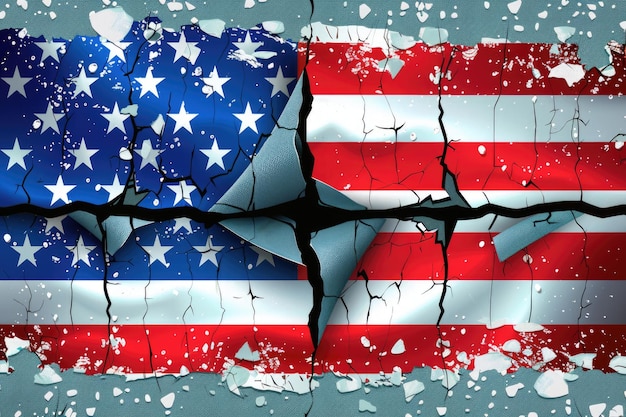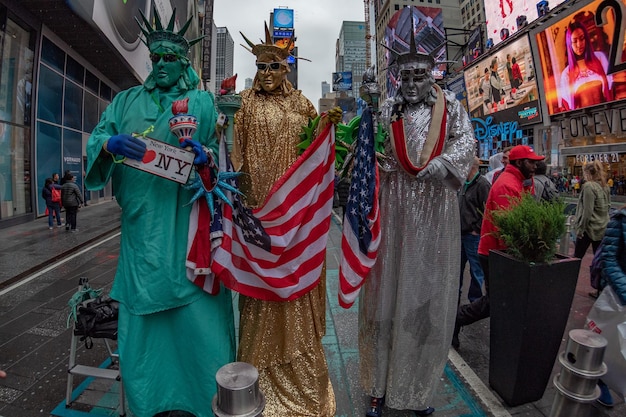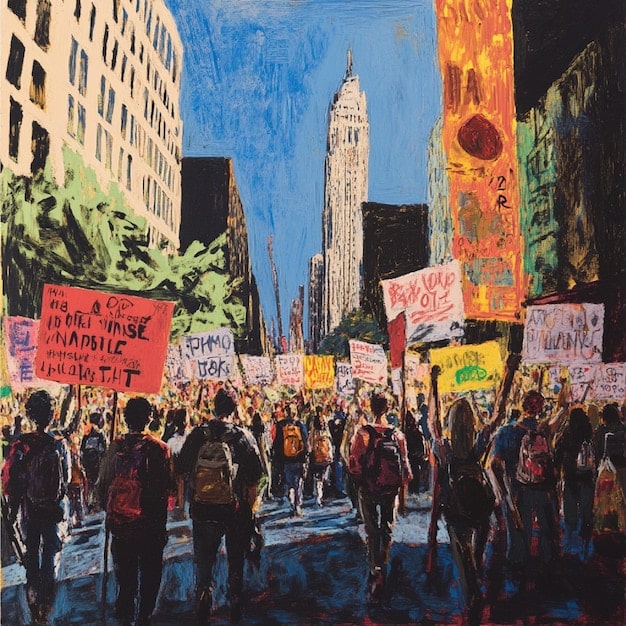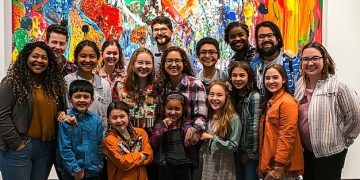Political Polarization Impact on American Culture in 2025

Anúncios
Understanding the Impact of Political Polarization on American Culture in 2025 reveals how deeply divided political ideologies could reshape social norms, values, and everyday interactions in the United States, affecting everything from media consumption to community engagement.
The pervasive nature of political polarization is reshaping the American landscape. To fully grasp Understanding the Impact of Political Polarization on American Culture in 2025, we must delve into its potential effects on various aspects of society.
Anúncios
The Shifting Landscape of American Values
Political polarization isn’t just about differing opinions; it’s about the fundamental values that underpin American society. As ideologies drift further apart, the consensus on shared values erodes, leading to a more fragmented cultural identity.
Erosion of Common Ground
Historically, Americans could agree on certain core principles, despite political differences. However, with increasing polarization, even these basic agreements are being challenged, making it harder to find common ground.
Anúncios
The Rise of Tribalism
Political affiliation is increasingly tied to personal identity. People are more likely to associate with and support individuals and groups that share their political beliefs, leading to a sense of “us vs. them.”
- Increased social segregation based on political views.
- Decline in cross-party friendships and relationships.
- Reinforcement of echo chambers in social and professional circles.

This shift can transform community bonds, turning conversations into conflict zones and eroding social cohesion. Navigating these cultural divides necessitates empathy and a deep understanding of divergent perspectives.
Media Consumption in a Polarized America
Media plays a crucial role in shaping public opinion. In a polarized environment, media outlets often cater to specific political ideologies, further reinforcing existing biases and creating echo chambers.
Fragmented News Ecosystem
The rise of partisan media outlets has led to a situation where people primarily consume news and information that aligns with their pre-existing beliefs. This limits exposure to diverse perspectives and contributes to further polarization.
The Spread of Misinformation
Polarization creates an environment where misinformation and disinformation can thrive. Partisan media outlets may prioritize spreading narratives that support their political agenda, even if those narratives are not entirely accurate.
- Increased reliance on social media for news, where misinformation spreads rapidly.
- Decline in trust in mainstream media outlets.
- Difficulty in discerning credible sources from biased ones.
The implications of these trends are profound, affecting public discourse and fueling division. To combat these effects, critical media literacy and diverse news consumption are essential.
Arts and Entertainment: A Battleground
Even the arts and entertainment industries are becoming increasingly politicized. Artists and entertainers often use their platforms to express their political views, which can alienate audiences who hold opposing beliefs.
The Politicization of Art
Art has always been a reflection of society, but in a polarized environment, it can become a tool for political expression. This can lead to art that is divisive rather than unifying.
Cancel Culture and Its Impact
The fear of being “canceled” for expressing unpopular opinions can stifle creativity and lead to a homogenization of viewpoints within the arts and entertainment industries. This can limit artistic diversity and innovation.

The politicization of arts and entertainment can impact cultural exchange and understanding and emphasizes the need for diverse voices in the creative sphere. By fostering open dialogue, we can encourage a cultural landscape inclusive of varied narratives.
Education and the Battle for Minds
Education is another area deeply affected by political polarization. Debates over curriculum content, teaching methods, and school policies reflect the broader ideological divisions within society.
Curriculum Controversies
Political groups often clash over what should be taught in schools, particularly regarding history, science, and social studies. This can lead to curriculum controversies and politicization of education.
The Role of Teachers
Teachers are increasingly caught in the crossfire of political debates. They may face pressure from parents, administrators, or politicians to present certain viewpoints or avoid controversial topics.
- Limits on academic freedom and open inquiry.
- Increased scrutiny of teachers’ personal beliefs and activities.
- Challenges in creating inclusive learning environments for all students.
Navigating this landscape requires prioritizing critical thinking and open dialogue. Educational institutions must foster spaces where students can respectfully engage with diverse perspectives, ensuring informed and engaged citizens.
Community and Social Interactions
Political polarization affects our daily interactions, shaping friendships, relationships, and community engagement. The increasing divide can lead to social isolation and a decline in civic participation.
Decline in Civil Discourse
Polarization makes it harder to have respectful conversations about political issues. People are more likely to dismiss or demonize those who hold opposing views, leading to incivility and conflict.
Social Segregation
People are increasingly choosing to associate with others who share their political beliefs, leading to social segregation. This can reinforce echo chambers and make it harder to bridge ideological divides.
- Reduced participation in community organizations and civic activities.
- Increased reliance on online interactions, which can exacerbate polarization.
- Erosion of social trust and cooperation.
Active community building emphasizing common goals contributes towards reducing fragmentation. Through inclusive, respectful dialogues, reconciliation can begin at the grassroots level, fostering more cohesive communities.
The Future of American Identity
Political polarization poses a profound challenge to American identity. As the nation becomes more divided, it becomes harder to define what it means to be an American and to maintain a sense of shared purpose.
Re-evaluating American Values
Polarization forces us to re-evaluate what values are truly essential to American identity. This can be a painful process, but it also presents an opportunity to create a more inclusive and just society.
Building Bridges Across Divides
Overcoming political polarization requires a concerted effort to build bridges across ideological divides. This involves engaging in respectful dialogue, seeking common ground, and working together to solve shared problems.
- Promoting critical thinking and media literacy.
- Encouraging empathy and understanding of diverse perspectives.
- Strengthening community bonds and civic participation.
Addressing this fundamental challenge requires a multifaceted approach, emphasizing the essence of unity in diversity and seeking shared solutions. Restoring trust through transparent communication will be crucial for American culture in 2025.
| Key Point | Brief Description |
|---|---|
| 💔 Erosion of Common Values | Political polarization challenges shared values, leading to fragmented cultural identity. |
| 📰 Media Fragmentation | Partisan media reinforces biases, creating echo chambers and spreading misinformation. |
| 🎭 Politicized Arts | Arts become a battleground; ‘cancel culture’ stifles diverse expression and creativity. |
| 📚 Educational Divides | Curriculum controversies and pressures on teachers politicize education, limiting inclusive learning. |
Frequently Asked Questions
▼
Political polarization impacts daily life by affecting personal relationships, community interactions, and media consumption, leading to social segregation and reinforcing echo chambers.
▼
Media plays a key role by catering to specific ideologies, reinforcing biases through partisan reporting, and spreading misinformation, which further divides public opinion.
▼
Education can address polarization by emphasizing critical thinking, promoting media literacy, and creating inclusive environments where students can engage with diverse perspectives respectfully.
▼
Long-term effects include a fragmented cultural identity, erosion of shared values, and challenges in maintaining a sense of national unity and purpose, potentially leading to increased social unrest.
▼
Individuals can reduce polarization by engaging in civil dialogue, seeking common ground, consuming diverse media sources, and participating in community activities that bridge ideological divides.
Conclusion
Understanding the Impact of Political Polarization on American Culture in 2025 underscores that a divided society shapes not just politics but every aspect of American life, from media and arts to education and community. By acknowledging these impacts, promoting dialogue, and seeking common ground, we can strive for a more unified and resilient American future.





